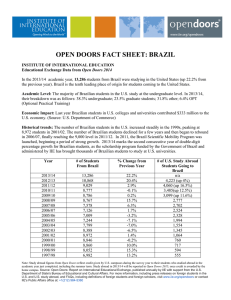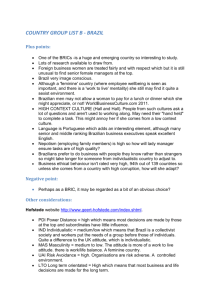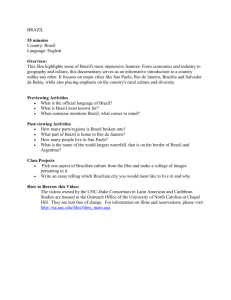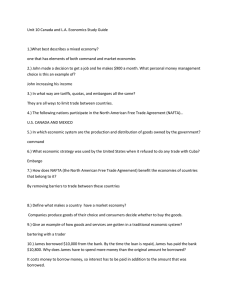An Introduction to the International Academic Partnership Program December 18, 2014
advertisement
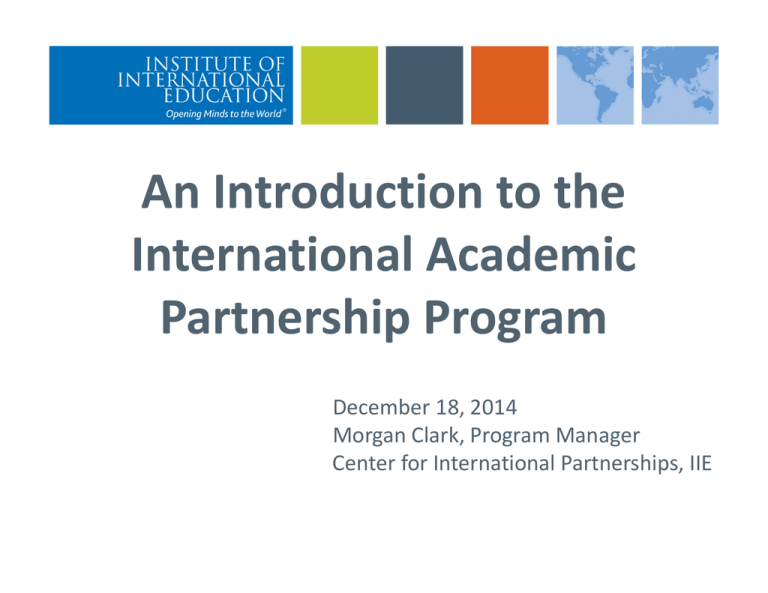
An Introduction to the International Academic Partnership Program December 18, 2014 Morgan Clark, Program Manager Center for International Partnerships, IIE Agenda • • • • Introductions Overview of IAPP Goals & Expectations IAPP Elements: • • • • • Resources Steering Committee Webinars Study Tour Strategic Planning Worksheet • Timeline • Questions 2014‐2015 IAPP Brazil Participating Institutions Bellevue College California State University‐East Bay Indiana University of Pennsylvania MCPHS University Minnesota State University‐Mankato New York Institute of Technology University of California‐Irvine University of Wisconsin‐La Crosse Overview of IAPP • Began in 2009 through a grant from the Department of Education’s Fund for the Improvement of Postsecondary Education (FIPSE) • Purpose: • To enhance academic linkages with India and China • To become a self‐sustaining program and expand to other focus countries Current/Past IAPP Participants Marquette University (2014 Vietnam) Portland State University (2013 India) Brookdale Community College (2012 Brazil) Greenville Technical College (2011 China) Howard University (2013 Brazil) Rutgers University (2012 India & Brazil) UNC Charlotte (2013 India) Dartmouth College (2014 Brazil) George Mason University (2012 India) Queens College, CUNY (2012 India & Brazil) Western Michigan University (2013 Brazil) UMass Lowell (2012 Myanmar) Arizona State University (2013 Brazil) University of Kentucky (2012 India) University of Missouri (2014 Brazil) University of Washington (2012 Myanmar) Daemen College (2012 Brazil) University of Southern Indiana (2011 China) IAPP Brazil Goals • Learn about Brazilian higher education system and institutions’ partnership priorities • Better understand your institution’s strengths and weaknesses pertaining to Brazil. • Develop processes on your campus for partnership building. • Engage diverse campus stakeholders in the concept of a Brazilian partnership. • Develop a comprehensive strategy for partnering with Brazil. • To foster deep, sustainable, institution‐wide partnerships with Brazil False Expectations for IAPP Brazil • We will have a partnership with a Brazilian counterpart a year from now. • We will receive more Brazilian students as a result of IAPP. • IIE will help broker a partner. • The partnership will be an immediate source of revenue for your institution. Realistic Expectations for IAPP Brazil • IAPP will provide guidelines for assessing on‐ campus international partnership capacity and developing practical strategic plans for international programs. • Partnership building is a long, complex process, but the strategic planning exercises will help prevent roadblocks in the long run. • The IAPP Cohort itself will be an excellent resource. • IAPP will expose you to a wide range of opportunities pertaining to Brazil. IAPP Elements • • • • • • • • • Initial Survey Webinars Resources Steering Committee Strategic Planning Worksheet Study Tour Mentor Feedback Final Report Final Evaluation Steering Committee • Opportunity to engage diverse stake holders (at least one decision maker, someone who reports to the president, variety of academic departments, heritage faculty, community members, trustees, etc.) • Inform them about IAPP and the deliverables , set expectations • Consider dividing the Steering Committee into working groups (the Strategic Planning Worksheet). • Some institutions formed a smaller “Brazil Task Force” that meets more regularly and makes decisions. • Provides a basis for how to structure partnership building in the future. Strategic Planning Worksheet • Jumpstart an internal assessment of your existing engagement with Brazil • Engage campus stakeholders in the strategic planning process • Assess institutional strengths • Create a snapshot of the institution’s capacity for partnerships • Develop a strategic plan for Brazil Study Tour • 6‐day tour, beginning with a day‐long IAPP workshop on Sunday, followed by meetings and site visits. • 3 cities • IAPP fee covers in‐country costs, including hotel, food, domestic flights, and local transportation, for one representative from each participating institution. • Each campus is responsible for covering international airfare for each participant. • IIE strongly suggests that each institution funds at least one additional representative to travel along with the delegation. ($5,000 each, excl. int’l airfare) Study Tour Goals IIE hopes participants return to their campuses with the following: • A thorough understanding of the Brazilian higher education system • First‐hand experiences at a variety of institutional types • Knowledge of Brazilian structures for partnership building • Knowledge of Brazilian priorities for partnership building • Clarification of partnership goals • Interesting partnership ideas • List of contacts to follow up with • Excitement to return to your campus to craft a future partnership Signing an MOU is NOT a goal of the IAPP Study Tour IAPP Elements • • • • • • • • • Initial Survey Webinars Resources Steering Committee Strategic Planning Worksheet Study Tour Mentor Feedback Final Report Final Evaluation Timeline December 2014 Form Steering Committee and send update from first meeting by 1/30 February 2015 IIE Distributes Strategic Planning Worksheet March 2015 Strategic Planning Worksheet Due March/April 2015 Brazil Study Tour Post Study Tour Mentor‐Mentee Introductions Review of Strategic Planning Worksheet Part II of Webinar Series November 2015 Final Report Due Questions Morgan Clark: mclark@iie.org


